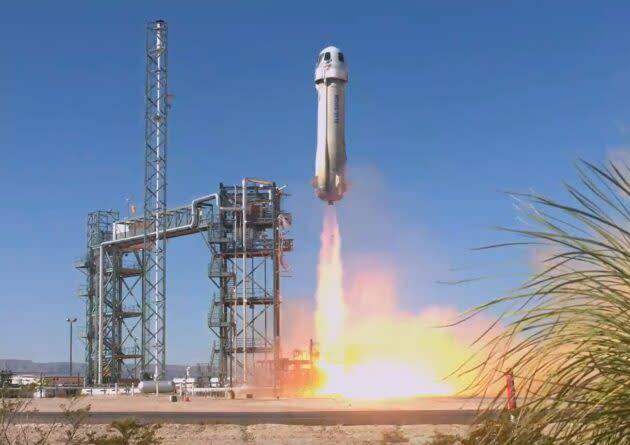Blue Origin flies its first crew in 21 months — and writes another page in space history

Jeff Bezos’ Blue Origin space venture today resumed sending people on suborbital space trips after a 21-month gap, and made a Black aerospace pioneer’s 60-year-old dream come true in the process.
“Man, it feels good to be flying again,” launch commentator Ariane Cornell said.
The six spacefliers on Blue Origin’s New Shepard rocket ship included Ed Dwight, a retired military test pilot who missed his chance to become NASA’s first Black astronaut in the 1960s. Today’s flight made Dwight, 90, the oldest person to go into space, albeit on a suborbital rather than an orbital trip.
Dwight took part in an Air Force training program that was meant to prepare participants for astronaut duty — but he was passed over. Whether that was because of racial politics or because he was too short to meet NASA’s standards has been a topic of debate. In any case, it would be another two decades before Guion Bluford Jr. became the first Black American in space in 1983.
Dwight went on to become a sculptor but held onto his dream of spaceflight. His Blue Origin trip was sponsored by a nonprofit group called Space for Humanity, with an assist from the Seattle-based Jaison and Jamie Robinson Foundation.
When he stepped out of the capsule today, Dwight told well-wishers said that his space experience was “a long time coming” and that he was “overwhelmed.”
“It’s a life-changing experience. Everybody needs to do this,” he said. “I thought I didn’t need it in my life … but I lied.”
This isn’t the first time Blue Origin has taken a page from space history: In 2021, one of the participants in the company’s first crewed spaceflight was Wally Funk, a member of the “Mercury 13” group of women who went through astronaut training in the 1960s but never got to space. That mission made Funk the world’s oldest spaceflier at the age of 82. Funk’s record was broken by Star Trek actor William Shatner during another Blue Origin flight later that year — and now Dwight has surpassed Shatner’s record by a month and a half.
Dwight’s crewmates on today’s flight were venture capitalist Mason Angel, French brewery founder Sylvain Chiron, software engineer Kenneth L. Hess, retired CPA and adventure traveler Carol Schaller, and airplane pilot and entrepreneur Gopi Thotakura. They are presumed to have paid their own way, but Blue Origin isn’t saying how much they paid.
Today’s mission, known as NS-25, was the 25th flight of the suborbital New Shepard program. Seven of those flights have been crewed, with a total of 37 people taking trips from Blue Origin’s Launch Site One in West Texas.
NS-25 followed the typical model for a New Shepard flight. The spaceship’s hydrogen-fueled booster lifted off into clear skies, sending the crew capsule to a maximum height of about 107 kilometers (66 miles) — well beyond the 100-kilometer (62-mile) Karman Line that serves as the internationally accepted boundary of outer space.
After the capsule’s separation from the booster, the spacefliers experienced a few minutes of zero-gravity and gazed out through New Shepard’s giant windows. Then they strapped themselves back into their seats for a parachute-assisted, airbag-cushioned landing amid the Texas rangeland.
One of the capsule’s three parachutes failed to inflate fully during the descent, but Cornell said that was “perfectly OK for this system.” Blue Origin is likely to review the data and address any concerns about the parachute system.
Meanwhile, the booster made its own autonomous landing on a pad not far from where it took off. The mission lasted 9 minutes and 53 seconds from launch to the capsule’s touchdown.
In addition to carrying people, NS-25 carried postcards submitted by students as part of a program offered by the Club for the Future, Blue Origin’s educational nonprofit foundation. The spacefliers brought along their own set of postcards.
This was the first crewed New Shepard flight since August 2022. A month after that flight, a different New Shepard craft experienced a launch anomaly during an uncrewed research mission — and that forced a yearlong suspension of Blue Origin’s launches. Blue Origin followed up on the investigation by taking more than 20 corrective actions, including a redesign of the BE-3 rocket engine’s nozzle. Last December, a successful uncrewed flight set the stage for today’s trip.
In addition to the suborbital New Shepard program, Kent, Wash.-based Blue Origin is developing an orbital-class New Glenn rocket that could have its first launch from Florida later this year. The company is also working on a lunar lander for NASA’s use, a multi-mission orbital platform known as Blue Ring, a commercial space station project called Orbital Reef, and other advanced programs including a system for producing solar cells from lunar materials and beaming power between lunar installations using laser light.
